Are you thinking about replacing your old cookware? Why not consider cast iron cookware. Cast iron cookware is a great kitchen all-rounder because the same pot can be used on the stovetop or in the oven. But if you are new to cast iron, you may want to know the benefits of cast iron cooking.
There is good reason cast iron cookware has been the favorite in so many households over the years. But like all cookware, cast iron has a few pros and cons, which you can discover by clicking the link. And when you are ready for your own skillet, here is a link for my favorite skillets for new and experienced cooks.
Table of contents
- A list of the benefits of cast iron cookware.
- The benefits explained in more detail.
- Reasons for you to the make the switch to cast iron cookware.
- Final thoughts
What are the benefits of cooking with cast iron?
Natural cooking surface | Cast iron has one of the most natural cooking surfaces. It is made of just two materials, iron and carbon. |
More eco-friendly | Most foundries use recycled iron to manufacture ironware. |
Long-lasting | Cast iron cookware can last for decades. Some vintage pans are over 100 years old and still usable today. |
Suitable for many cooking methods | I’ll cover this topic in a separate article but safe to say you can use cast iron for almost any type of cooking. |
Almost unbreakable | You’re more likely to break your kitchen tiles than your cast iron pans. |
Semi nonstick | Cast iron is a lot more nonstick than stainless steel. And food releases easily. |
Thermal density | If your want to keep food warm on the table, then use cast iron. |
Even cooking | Yes, cast iron is a lot more forgiving than flimsy pans. |
Many choices available | Almost all major cooking brands have cast iron cookware available. |
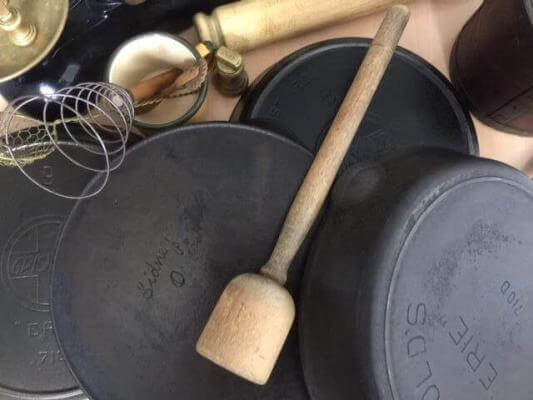
Cast iron cookware is made from natural materials.
Cast iron cookware is made from molten iron and carbon poured into a mold. And the cookware contains no other metals to prevent rust. Instead, cast iron cookware is coated with polymerized oil.
The cookware is also durable, and you can cook with antique cast iron from the 19th-century that is still in usable condition.
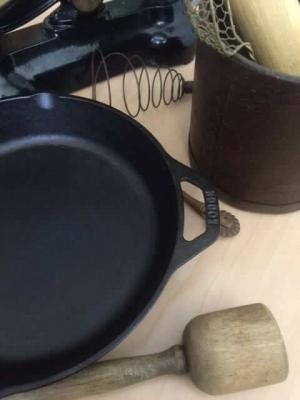
Using cast iron cookware is better for the environment.
It may not be the first benefit that comes to mind but using cast iron is going green. From an environmental point of view, cast iron is one of the most natural products on the market. It has benefits such as:
- Iron cookware uses naturally accruing materials.
- Seasoned cast iron uses no chemicals or dyes.
- No plastic is used. I would avoid cast-iron with plastic handles.
- Foundries recycle defective pans.
- Cast iron cookware can be made from recycled sources.
- Cast iron cookware can last many decades.
You can use antique cast iron.
Vintage cast iron is considered better than newer pieces because the manufacture was slightly different. And one benefit is older cookware has a smoother cooking surface than what is often available today.
So if you have inherited cast iron from your parents or grandparents, make sure that you hold onto them. If by any chance you happen to come across antique cast iron at a garage sale, have a quick check of the maker. Some of the older American pans are of excellent quality and are true collectors’ items.

Boonie Hicks educational articles on vintage cast iron
Griswold Manufacturing Co. Learn the history of Griswold Manufacturing. | Extremely collectible cast iron and one of the biggest cast iron manufacturers in the 19th and 20th centuries. |
Wagner Manufacturing Co. Click to learn how to identify Wagner Ware. | Wagner is one of the most successful foundries of the 20th-century. |
Wapak Hollow Ware Co. Click to learn about the history. | Wapak made one of the most iconic logos called the Indian Head. |
Favorite Stove and Range Co. Learn about this lesser-known foundry. | This company operated a large-scale foundry and made some of the finest cast iron hollowware. |
Vintage cast iron category page Click to check out all the vintage cast iron articles. | If you want to learn more about vintage cast iron. Then be sure to check out the entire list of interesting articles. |
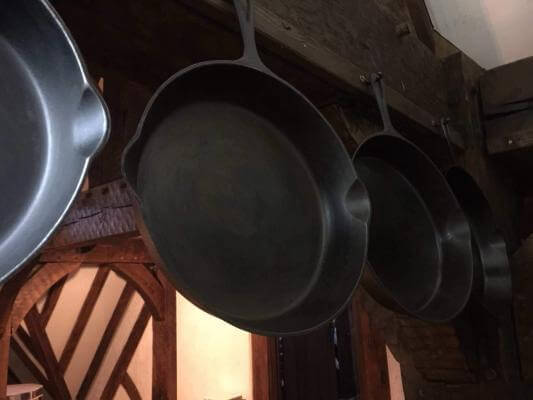
Cast iron can be cheap.
Bare or pre-seasoned is usually a lot cheaper than enameled cast iron and some vintage pieces. You can also pick up new cast iron cookware pretty much at any home center and department store.
However, cheap iron can have a rough cooking surface. If you are looking for a trusted brand at a lower price point, then consider a Lodge.
I kinda have a soft spot, Lodge. They make pre-seasoned cast iron cookware that is ready to use out of the box. I really don’t think you can go wrong with them.
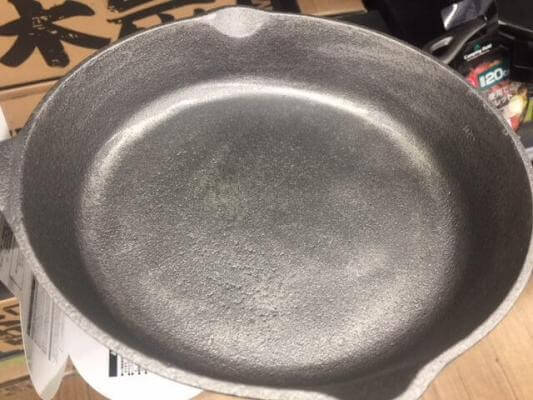
What are the benefits of cooking with cast iron cookware?
It is difficult to find anything more useful in the kitchen than a cast iron skillet. And you can use your cast-iron frying pan for the following cooking methods.
- searing
- sautéing
- frying
- baking
- roasting
And you can use an iron cooking surface for pastry dishes such as:
- pizzas
- pies
- cobblers
Another benefit of cast iron is the material has excellent thermal density. People often confuse this with thermal conductivity. With thermal density, the cast iron remains hotter for longer. Perfect for Mac and Cheese that would otherwise go cold on the table after five minutes.
More reasons to use a cast iron skillet.
Iron is a proven material for safe cooking.
Cast iron has been around for a long time. Historians suggest that people have been using cast iron as early back as the 3rd Century in China. Since then, people from all over the world still use cast iron as their cookware of choice. Here’s an article on the evolution of cookware to learn the history of different cooking materials.
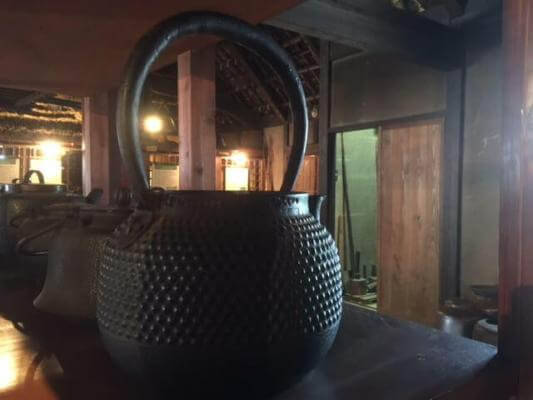
Cast iron cookware is sturdy and durable.
Cast iron pans are heavy, but the cookware can last for years. Although cast-iron pots and pans tend to rust when they are not well cared for. It should last decades if properly cared for.
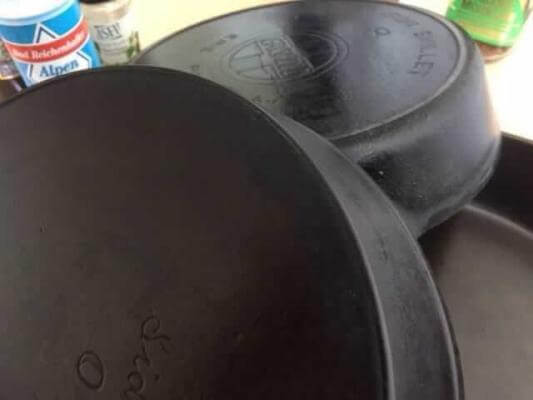
Use less oil
If you want to know why you should use a cast iron skillet there are so many reasons for one, cast iron naturally allows you to cut down on your oil use. This is because it is more nonstick and releases food better than stainless steel.
When using cast iron, all you have to do is preheat your pan and add a small amount of oil. A small thin layer of oil on the surface is all that you may need. Stainless steel often holds on to food more, so more oil is required to avoid hard scrubbing when cleaning.
Regular cast iron is more nonstick than stainless steel and enamel cast iron.
Well-seasoned cast iron has a naturally nonstick surface. Unlike other nonstick cookware, cast iron pots and pans are not coated with synthetic components. However, pre-seasoned cookware is nowhere near nonstick as Teflon. But cast iron cookware, from my experience, is a lot easier to clean and releases food better than stainless steel.
If you’re new to cast iron cooking. Then here’s an article you may find interesting Why cook with cast iron?
Iron cookware can withstand high heat.
Cast iron’s ability to withstand high heat is one of the primary reasons cast iron cookware is the best to use for all types of cooking. The cookware can also be used outside on an open flame. You can even put hot coals on a Dutch Oven without any fear of damage.
The capacity to withstand high temperatures also means that cast iron skillets can be used for searing, sautéing veggies, and frying. The high heat leaves a crispy layer on the outside without making the food mushy or dry in the center.
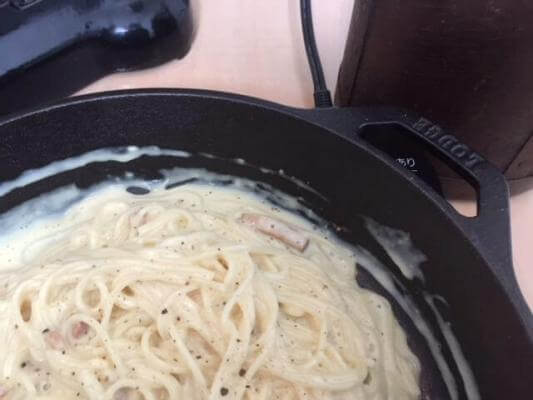
Cast iron cookware is often inexpensive, and there are lots of choices.
A great benefit of cast iron cookware is you are not restricted to a couple of leading brands.
There is a wide range to choose from. I would still go with a company you’re familiar with. My advice would be to make sure the cookware is seasoned. Without seasoning, the cookware could be rough to handle. Seasoning also gives a protective layer to the cookware and will prevent rust.
What are the benefits of cooking with cast iron cookware?
I have covered some of the main benefits of cast iron cookware. If you use cast iron cookware, I hope you get as much joy from it as I do.
References
- 10 Myths About Cast Iron Cookware, Busted (www.lodgemfg.com)
- The Irreplaceable Cast Iron Pans (https://whatscookingamerica.net)

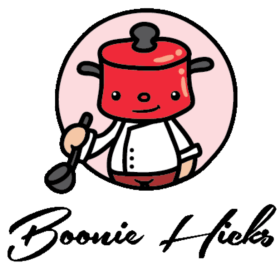
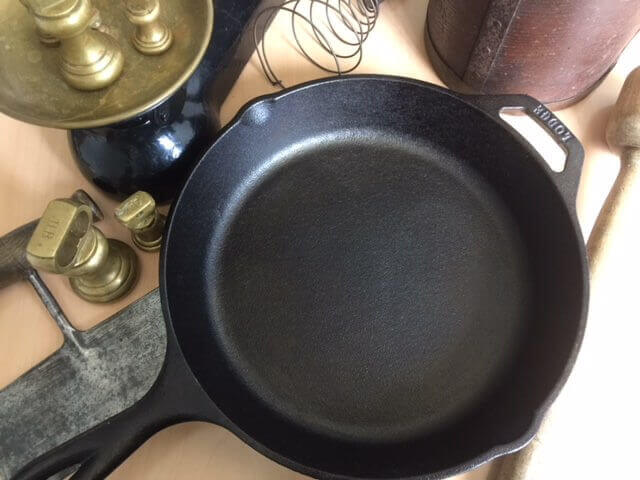
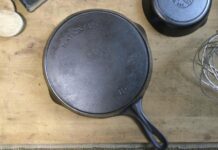
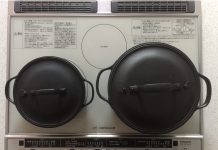
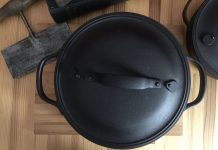



Hi Boonie
I bought home a large, modern Lodge frying pan from the thrift store at the dump. It was a little rusty, so I scrubbed and cleaned it and put it right to work, with no seasoning routine. I do rub it with vegetable oil when I’m finished using it, and so far it has functioned just fine. All 16 of my other pans are properly seasoned, including my grill pan and my two Dutch ovens. Even my griddles are properly seasoned, even though one griddle is strictly for pancakes.
Hi Wayne
It’s great that you recused a modern pan despite it being rusty. It sounds like you had a lot o experience seasoning your cast iron, so I suspect the pan will be seasoned in no time. Thanks for sharing.
I’m 70 and I learned how to season and keep the seasoning fresh from my grandmother, who was born in 1900. She was a chef and managed restaurants. I have her skillets and dutch ovens, various brands, mostly from the 30’s, 40’s and I suppose, the 50’s and 60’s as a couple are marked “USA”. Boodie would have gotten new ones occasionally as she loved to cook and bake. I was only in grade school when she taught me to oil and heat the pans in a hot oven, then reduce the heat and leave it overnight.
Perhaps those were her new pans. She taught me and my sister to oil a pan well after cooking with tomato sauce and to use salt for scrubbing away any food that stuck after wiping it clean. She used soap and water, but we dried them right away and rubbed oil on the cooking surface if it was needed.
These techniques were used routinely so a skillet was never rusted or grimy. Still smooth as a baby’s butt. These routines aren’t new. I’m sure there were various ways to keep cast iron well and that most cooks knew some tricks of the trade, learning them as we did, from our mothers and grandmothers, or the campers and hunters who packed up the kitchens.
Dear Maureen
Thank you so much for passing on your mother’s cast-iron tips and techniques for maintaining her cookware. I will surely take inspiration from these tips in a future article.
Kindest wishes
Hi there
I have been using cast iron cookware for nearly thirty years and have been collecting it for almost 30 years. As part of my love for cast iron, I have watched countless videos on use and seasoning. But, I just can’t get it out of my head that my great grandmother didn’t go through all of those seasoning routines at all.
I suspect that she brought home her pan from the general store, scrubbed it good with her homemade lye soap, and started cooking with it right away. Maybe with some bacon or pork chops fried in lard. Is this possible, and perhaps probable?
Hi there Wayne
I think you could be right. Everyone seems to fuss over their cast iron cookware. Personally I think this is great, and it shows how much people want to care for their heirloom pieces. But I’m sure the old-timers weren’t too concerned how they cleaned or seasoned their cookware.